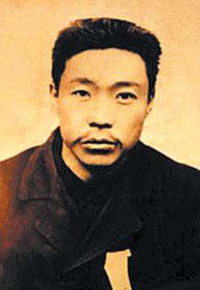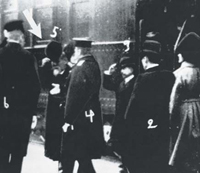NORTHEAST ASIAN HISTORY FOUNDATION 07/2010
-
Kim Hyeon-cheol Research Fellow, Office of Policy Planning
 Patriotic martyr Ahn Jung-geun
Patriotic martyr Ahn Jung-geunWith the monsoon season in full swing, Tokyo is ushering in the summer with great enthusiasm for the World Cup. Fuji Television is airing the Korean TV drama Iris and introducing kimchi stew and other Korean dishes. That is, the "Korean Wave" is still hot on Japanese TV networks. Against such a backdrop, NHK produced a five-part documentary series entitled Japan and the Joseon Peninsula (Korean Peninsula) to mark the centennial of Japan's annexation of Korea. The documentary series provides an overview of the events that have transpired between Japan and the Korean peninsula during the 100 years since the 1910 annexation and reexamines the historical progression of Korea-Japan relations.
The first installment, "Path to Japan's Annexation of Korea: Ito Hirobumi and Ahn Jung-geun," aired on April 18. It looks at the process by which Japan annexed Korea after the Russo-Japanese War and introduces Ito Hirobmumi's Korean policy as well as Ahn Jung-geun's treatise on peace in East Asia. The second installment "March 1st Independence Movement and the Pro-Japanese Faction," which aired on May 16, discusses the background of the March 1st Independence Movement and its impact on Japan's colonial rule as well as the process by which Lee Gwang-su and Choi Nam-seon became supporters of Japanese rule. The third installment, "People Mobilized for the War: Era of the Assimilation Policy," aired on May 20. It features Koreans mobilized for war from after the Sino-Japanese Wars to the Pacific War, including volunteer soldiers and women's labor corps recruits as well as Korean soldiers who died serving as kamikaze pilots.
Among the installments, "Path to Japan's Annexation of Korea: Ito Hirobumi and Ahn Jung-geun" received the most attention in both Korea and Japan. It deals with the process by which Japan annexed Korea, depicting it as an inevitable course of action taken to safeguard Japan and Asia's security against Western powers, especially Russia. Ito Hirobumi, who is generally portrayed as a major contributor to Japan's successful modernization, is depicted as a realist politician who envisioned Joseon's autonomy.
Japan's interest in Ahn Jung-geun's treatise on peace in East Asia
 Ito Hirobumi arrives at Harbin
Ito Hirobumi arrives at HarbinStation (arrow)
The first installment explained that while King Gojong and Joseon (Greater Korean Empire) resisted Japan by dispatching a secret delegation to the Hague, they did affix the government seal on the annexation treaty. Amidst this national crisis, Ahn Jung-geun assassinated Ito Hirobumi and advocated peace in East Asia. That is why, the documentary explicates, Ahn has become the symbol of the spirit of independence and peace for the Korean people of today. At the same time, the Japanese media and press have expressed concerns that Korea's growing interest in Ahn and memorial events in his honor may fan anti-Japanese nationalism in Korea.
I watched the documentary series in Japan, where I currently reside. Therefore, I got to discuss the series with many Japanese people One Japanese professor assessed that Ahn's treatise on peace in East Asia was very idealistic and was curious about why there is renewed interest in the treatise in Korea. A Japanese journalist commented that Ahn, like Sat Yat-sen 100 years ago, championed Pan-Asianism.
The NHK documentary series must have been shocking to some Japanese as it showed how the treatise on East Asian peace had come from Korea 100 years ago and conceived by none other than Ahn Jung-geun, who assassinated Ito Hirobumi. It is evident that Ahn's vision for peace in East Asia is being recognized by the Japanese as a point of consideration in the effort at resolving lingering historical issues with Korea.
However, some parts of the coverage raise concerns. In the first installment, Ito Hirobumi is portrayed as a figure that had good intentions for the Korean people and pursued peaceful policies vis-à-vis Japan's neighbors. In the second installment, "March 1st Independence Movement and the Pro-Japanese Faction," it is said that after Governor-General Saito, Japan tried to change the Korean people's attitude and make them cooperate with the Japanese colonial rulers by pursuing cultural, political, and colonial modernization. There is mention of a diary entry of a Japanese military commander stationed in Korea in which he likened Japan's annexation of Korea as an unreasonable "marriage." It is also said that Governor-General Saito had recommended Joseon's autonomy to the Japanese central government. In so doing, the documentary gives the impression that there were politicians who championed Korea's interests.
The series also look at Lee Gwang-su, who was involved in the February 8 declaration of Korean independence; Choi Nam-seon, who drafted the March 1 Proclamation of Korean Independence; and other leading Korean intellectuals of the time. The documentary states that these intellectuals came to the conclusion that Joseon could not gain independence right away and became Japanese collaborators. However, the documentary does not elaborate on the establishment of provisional governments overseas or various independent movements and armed resistance that took place both in Korea and abroad. Therefore, to viewers unfamiliar with Korean history, NHK's documentary series may give the impression that pro-Japanese sentiments had been widespread in colonial Korea.
Japan's "aim" in asserting good intentions
Currently, research on the history of Joseon and on other related areas conducted by Japanese academia focus on military volunteers among Korean students studying in Japan or post-1920 industrialization as colonial modernization, drawing on specific sources. It occurred to me that the Japanese scholars interviewed in the NHK documentary reflected this general research trend.
In the meantime, some Japanese intellectuals, politicians, and NGO activists are working hard to get the message across that Japan should reflect on history, recognize past mistakes, and expand exchanges and cooperation with Korea on the centennial of Japan's forced annexation of Korea. Specifically, they are promoting the declaration on the invalidity of the annexation and the return of some Korean artifacts as symbolic gestures demonstrating Japan's good intentions.
What should Korea's specific response be to Japan's divergent attitudes? I feel that it is not only important to come face to face with historical facts but also to propose a vision for the future that embraces Japan, China, and Northeast Asia at large.


